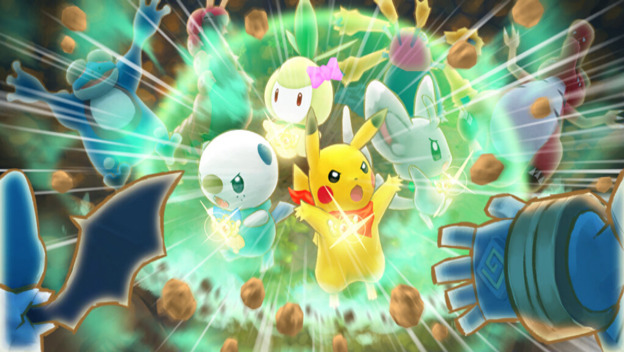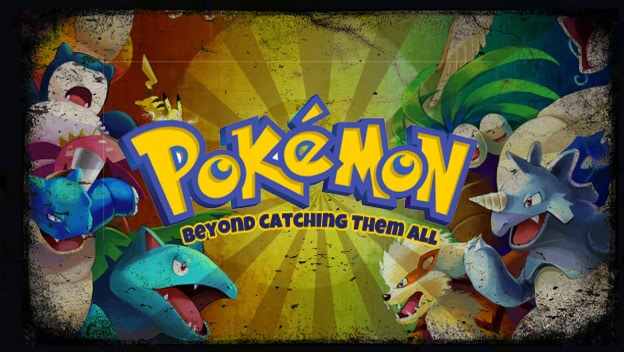Pokémon is a venerable series, long respected by devotees of Nintendo. People develop ordeals like the Nuzlocke challenge, collect memorabilia, and even get to Target an hour and a half before it opens in the hopes of acquiring a limited edition Pikachu 3DS XL. (Guilty!) Of course, these fans are holders of a deeper secret as well, though it’s one that those outside of Nintendo’s warm embrace have begun to become privy to. As good as the mainstay Pokémon games are, the spinoffs are just as heartwarmingly wonderful.
I’m not talking about the lukewarm games like Hey You, Pikachu! (the one where Pikachu never does as he’s told), Pokémon Channel, or Pokémon Dash. I’m talking about the respectable spinoffs. These are the puzzle games, the RPGs, the games you look at and initially think Nintendo’s pulling off a cash-grab, until you realize the hidden genius behind them.
The most orthodox of these are the games with RPG elements, Pokémon Ranger and Pokémon Mystery Dungeon. In the former, players are Rangers who take care of wild Pokémon, temporarily befriending partners to complete missions, but never capturing them. It’s more of an action game with real-time strategy elements, but it works because it presents a different view than the Pokémon/trainer relationship people are familiar with in more traditional Pokémon games.
In the same way, the Pokémon Mystery Dungeon series works because it provides players with an insight into the life of a Pokémon. Players get transformed into one as part of some epic quest to assist the Pokémon world, with either a personality test or brief choice determining their new race, and then must team with other Pokémon while exploring randomly generated dungeons. Like Pokémon Ranger, it works because it retains Pokémon mainstays, like special moves, abilities, and recruiting defeated opponents, while also offering a mildly challenging roguelike experience.
I have to admit, that’s what makes the PokéPark series work as well. Confession time: My name is Jenni, I’m 30 years old, and I have beaten both PokéPark Wii games. It isn’t my fault; they’re a triple whammy. First, they’re filled with adorable Pokémon wandering around a bright and vibrant theme park. Second, said Pokémon are ready to be played with and may even have errands for you to run or time for a quick real-time battle. Third, the minigames are surprisingly charming. Clearly, I had no chance, and given that the first game was successful enough to merit a sequel, I wasn’t the only one captivated by its charms.
Of course, there’s something to be said for Pokémon spinoffs that maintain the collecting element. The Pokémon Rumble series is one of them. It’s a beat ’em up featuring toy Pokémon that relentlessly fight, both in miniature environments and arenas against multitudes of other toy Pokémon. And no, I don’t know who takes the time to wind all of the figures up to prepare for battle (I know you’re wondering that very thing right now). It doesn’t matter. What does is that Pokémon Rumble U will capitalize on NFC technology like Skylanders and allow people to buy figures, which will be placed on the Wii U Gamepad to make the characters appear in the game. I’m already saving my money.
That isn’t to say that Pokémon spinoffs can’t be great unless they tap into some aspect of the original Pokémon series to make them more valid. The Pokémon puzzle games have absolutely nothing to do with the main series, other than tacking familiar characters onto Tetris Attack, pinball, or match-four games. Yet Pokémon Puzzle League, Pokémon Trozei, and the Pokémon Pinball games still manage to be enchanting. Naturally, Pokémon Puzzle League is the star of this cluster, with its incredible matching gameplay. For these games, the Pokémon affiliation is a vanity aspect, but they still prove how glorious spinoffs can be.
In the end, I say the Pokémon spinoffs with the best payoffs are the ones that shouldn’t work. The best examples are Pokémon Snap and Pokémon Conquest, two games that are based on absolutely crazy ideas. I mean, one’s an on-rails FPS where players take pictures of Pokémon, and the other is a strategic RPG that gives Pokémon to Feudal Japanese warriors and lets them conquer Ransei with them. Even now, just describing them, they sound absolutely ridiculous.

However, both of these games are magic. I’d say both inspire as much devotion from me as any mainstream Pokémon game. With Pokémon Conquest, I was dedicated to getting my warlords to evolve and pairing them up with the best Pokémon. When it came to Pokémon Snap, I turned into a typical drama queen artist. Every shot had to be perfect, and if it wasn’t I would storm off the set. Well, out of my living room anyway.
Clearly, Pokémon is a force to be reckoned with, and people ignore side entries at their own peril. As you can see, even the lowly spinoffs, the games that would normally be considered trite to capitalize on a classic, shine. I implore you, don’t just sit back, eagerly awaiting Pokémon X and Y. Join your brethren in celebrating games like Pokémon Conquest, take a chance on Pokémon Mystery Dungeon: Gates to Infinity and, most importantly, clamor furiously on the Internet about how a new Pokémon Snap installment would fit perfectly on the 3DS.
 | By Jenni Lada Lead Contributor Date: April 4, 2013 |
